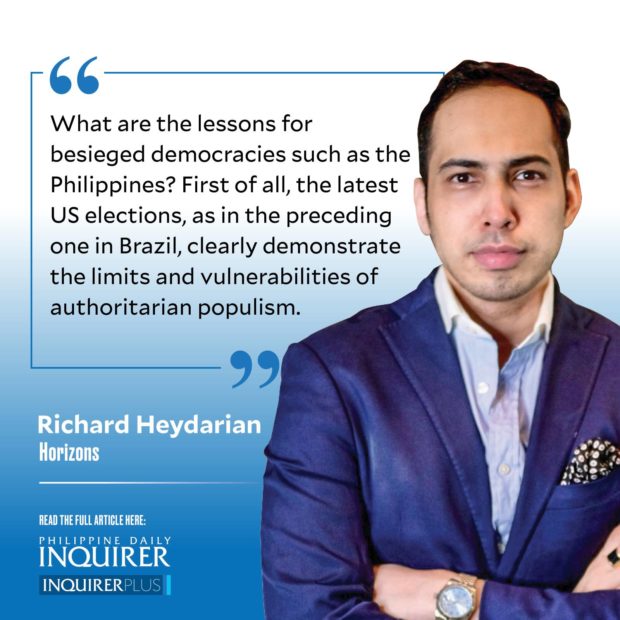US elections: Lessons for the Philippines
There was neither a “giant red wave” nor, to use former US president Barack Obama’s infamous term, any “shellacking.” Instead, President Joseph Biden ended up as the most successful incumbent in any first-term midterm elections since George W. Bush, who saw majority of the population rallying behind his party in the aftermath of the 9/11 attacks.
Almost all contemporary presidents saw their parties losing dozens of seats during their (first-term) midterm elections. By that metric, Biden is arguably the most successful Democratic president since John F. Kennedy.
Article continues after this advertisementIn fairness, pundits and polls had all the reasons to bet against the incumbent. After all, Americans, unlike Filipinos, tend to vote against incumbents during midterm elections—a reflection of the country’s inherent skepticism toward overconcentration of power in any single person or party, a tradition that dates back to the American Revolution against the British monarchy.
Moreover, Biden’s approval ratings are particularly low, with midterms taking place amid a historic uptick in interest rates and overall cost of living, which has hit countless American families across the country.
So, dear reader, let me first unpack this bizarrely interesting elections before delving into their significance for our beloved country. To begin with, this midterm elections was unique on three levels. The race was not only a referendum on Biden, but also on former president Donald Trump, who proactively backed a coterie of notorious election deniers in key races.
Article continues after this advertisementMoreover, in the wake of the Roe v. Wade Supreme Court decision, which cemented the conservative bent of the country’s highest court, many wing voters, especially suburban women, seemed less excited with a conservative-dominated legislature. And lastly, the generally progressive “Gen Z” voters heavily rallied behind the Democrats to, inter alia, stem the tide of Republican Kulturkampf.
With Democrats largely expected to hold onto the Senate, and narrowly conceding the Congress, the incumbent was particularly cheerful following the midterm elections. In a particularly sprightful press conference, Biden described the elections as “a good day for democracy,” while vowing to hold his ground against a potentially Republican-dominated Congress.
“I’m not going to change,” declared the president, confidently warning his Republican counterparts, while signing motion with his hand, “I have a pen that can veto.” Instead of one giant wave, the elections saw multiple whirlpools: Democrats did well in states where abortion rights and liberal democracy were on the ballot, while Republicans dominated in states where inflation as well as law and order issues were the top voter priority.
So, what are the lessons for besieged democracies such as the Philippines? First of all, the latest US elections, as in the preceding one in Brazil, clearly demonstrate the limits and vulnerabilities of authoritarian populism.
Trump hoped to leverage a prospective “red wave” as a launching pad for his presidential bid in 2024. Instead, he is now being blamed by both Republican rivals and leadership as the main cause behind the party’s shocking underperformance.
As Scott Jennings, a former top aide to Republican Senator Mitch McConnel, bluntly put it: “How could you look at these results tonight and conclude Trump has any chance of winning a national election in 2024?” This is music to the ears of Governor Ron DeSantis, who is, so far, Trump’s main Republican rival.
Moreover, the midterm elections also showed that voters are not only driven by purely economic or cultural issues alone, but instead by the combination of the two. Thus, successful candidates were those who took on both themes effectively.
And this brings me to arguably the biggest universal takeaway from the elections, namely the historic victory of Democratic candidate John Fetterman as Pennsylvania’s new Senator-elect, the first since 1962. He not only overcame a tough competition from a celebrity-millionaire Republican, but also survived a stroke earlier this year. His campaign has been one of extreme grit and determination. Fetterman belongs to a class of statesmen who can be best described as “the synthesizer,” combining both charisma and conviction. At once, the Harvard-educated candidate advocated for progressive policies, including universal health care, increased minimum wages, and abolition of capital punishment, while seamlessly standing out as a folksy, relatable, and compassionate leader, whom even conservative voters could relate too. By all indications, the synthesizers may be the best hope for the future of democracy.
rheydarian@inquirer.com.ph

















